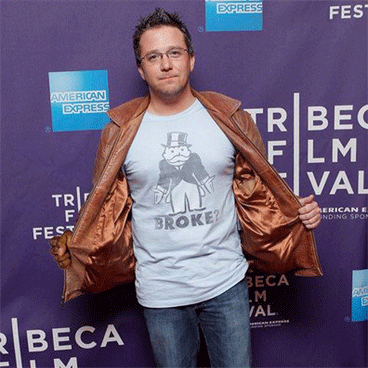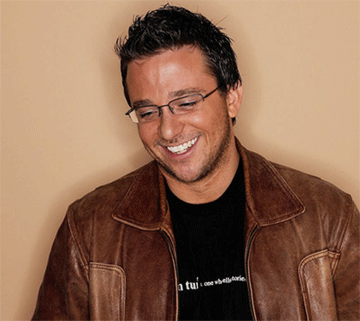
Billy Corben
On Friday, filmmaker Billy Corben joined Jessica Goldman, CEO of Goldman Properties, Ralph Pagano, American chef and television personality, and Rene Ruiz, luxury designer, for The Emerging Leadership Council of the Miami Beach Chamber of Commerce's Champions of Business Panel.
Eddie Dominguez, senior vice president and director of marketing, communications and community relations at City National Bank, moderated the panel. “Successful entrepreneurs are the backbone of our economy and our members and business leaders can learn so much from these Champions of Business who have dedicated themselves to innovation within their industry.” City National Bank is sponsoring the event.
"It's always interesting to see and hear how business leaders have achieved a high level of success and what their 'secret sauce' is," said Michael S. Goldberg, Chamber chairman and senior vice president of Gibraltar Private Bank & Trust.
So what is Corben's "secret sauce" and what pearls of wisdom can the Miami icon offer to attendees hungry to know how to make it in Miami?
Corben, with his producing partners Alfred Spellman and David Cypkin, founded content creation company, Rakontur, in 2000. In 2006, Corben and company made a name for themselves with the documentary Cocaine Cowboys, a groundbreaking film about the cocaine trade in the 1970s and 1980s in Miami.
The Florida native talks about the changing landscape of content creation, the state of affairs of being an arts business in Miami, and what's on the horizon for his company.
MS: How can someone find success as an entrepreneur in a business like yours?

Billy Corben
BC: Striking that balance between art and commerce is a combination of art and science and so I think a lot of arts related businesses are looked at as more as charity, 501c3s. Knight Foundation types. Many arts organizations don't exist in the free market. They exist in the foundation market ─ not to slight those kinds of things.
Not many people, I think, in this town understand what it takes to have a self-sustaining business, particularly in the arts or in filmmaking or whatever it may be. I think that it's very difficult to do. I don't know that (Rakontur) has a business model that can be easily duplicated. I discourage young people who say "I want to start a production company or I want to make documentaries." I tell them they should consider their options. I say, "Maybe there are other things you can do with your life." It's really challenging, particularly in Miami, to build a business like we've built. There's very little support for it ─ financing, small business loans, and talent. (Miami) has a talent drain. They attempt to ply their trade here with mixed results and then invariably the best of the best go on to New York and Los Angeles or Louisiana or places where there are film incentives that drive a local economy.
I think the silver lining in all this are the likes of the Borscht Kids, as I still call them. I'm not sure if they are still Borscht or if they are Kids, but there's a generation of young people who have become more committed to staying here, plying their trade, and telling their stories that are not only shot here, but take place here, and are inspired by Miami. In the '90s and into the '00s, Miami's film scene was marked by a transient tourism trade, where you had big studios and big filmmakers coming to town and using Miami and Florida as a location. Then they'd throw it away, and go home with their money and crews and artists. Now I'm hoping that the trend will continue ─ that we see people who are born, bred and trained here, and who choose to tell stories and make films here.
MS: So how have you sustained a film trade business in Miami for 15 years?
BC: Well, I think in our line of work in filmmaking and documentary filmmaking is that you have to find a good story and then don't F---- it up. And do it well. It's not simply to be the best at what you do, you have to find a niche. They say, "it's the niche that makes you rich." You have to find what you're best at, something that there is an interest in out there. That's the magic of NOW ─ that there's a true working class of artists of content producers, content creators and storytellers, and filmmakers. You can find your place and find your appeal and find your own strengths. You can make a living at least doing something that you love. You may not be rich, but you can build a comfortable business for yourself and your family. Have realistic expectations and make yourself good at something that you do better than anyone else ─ something that's a calling card for you. You just have to have that thing that puts you on the map, that lets you know who you are and what you're capable of.
MS: There's an interesting future right now in this knowledge-based society and with that comes content creation opportunities. What's your view of that statement?
BC: Listen, when we named the company Rakontur going back about more than a decade ago at least, we didn't put Productions in the name, or Studios, or Films ─ we named it because at that time you could see the writing on the wall, in the print business and the music business. Bandwidth was only going to get faster and sooner rather than later it would start to effect the visual content creation in the movie and TV delivery business. We knew that and we also knew that we could do anything. We could do content of any length,we could do fiction and nonfiction. We could put it on TV, or online, or in movie theaters. When we were kids, everyone wanted a studio deal, now everyone wants a streaming deal. There are five words that have completely changed our business "I'll Watch It On Netflix." That completely changes the metrics. We did our first non-fiction web series deal with "Clubland" in 2005. We were ahead of our time! Now we have a deal 10 years later direct to Netflix. Our movie, "Dawg Fight," premiered at the Miami International Film Festival, it was available for VOD, but otherwise it was a Netflix original, which is where most where most people see your content nowadays.
MS: You saw the future 15 years ago? Looking into your crystal ball, what do you see 15 years ahead?
BC: Individual studios are making fewer movies, TV shows. Now you have Hulu, Amazon, and even Verizon is getting in the game now. Original streaming content are where the opportunities are now ─ sure, it's digital pennies versus analog dollars. There's going to be a lot of cable channels that have been around since the advent of cable that will cease to exist. Many more newer channels will also go away as well. The market will not bear them because we can now program our own cable. All of us can program and stream whatever we want.
MS: So what are you up to right now?
BC: A pilot is being developed at TNT, based on "Cocaine Cowboys," inspired by the documentary. It was originally at HBO. We're working with Jerry Bruckheimer and Michael Bay. [He explains that it's been in the works for eight years.] No one can sustain that overhead and that kind of development. We as producers, we like to produce ─ we don't want to develop and go through three writers and two networks, we like to go out and get it done.
We like to work on a lot of different things at the same time and things that interest us. We make a living ─ it's not enough to do it for the money, you want to do it because you love it and interact with people that you're interested in and that will interest other people. We want to keep finding good stories and hopefully telling them well and in different formats. We're working on a SPIKE TV six-hour miniseries about John McCaffrey, and we're doing another project coming up with Netflix that I can't talk about just yet. [We plead with him to let us break the news right here.] I don't want to jinx it. We're talking to some other online platforms about short form web series. It's a little bit of everything – cable, TV, web series. It's cool to be able to do some of this stuff and still go to film festivals with old school things.
MS: Any advice for those of us out there that want to be successful entrepreneurs and content creators?
BC: The most important thing in this business model is whatever works. You can't just plug us into a particular peg.We're content creators. The company is Rakontur [The website subtitle says rakontur is a noun ─ one who tells stories with skill. Corben reiterates.] We try to tell stories with skill and we'll do that anywhere. That's the wonderful thing. Storytelling is the oldest form of popular entertainment ─ people around a fire or cave drawings, Japanese kabuki ─ it's all storytelling. This is an enduring art form and business model as long as you keep it small and you don't let ego and money drive your business or get too big so that eventually the bubble pops. That's how we have sustained so long. And never be above anything by saying "We don't do YouTube, we don't do streaming, we don't do television." We could've just said that we just do theatrical documentaries, but that would not have been a wise business model. We go wherever the opportunities take us.
 MAIN MENU
MAIN MENU

